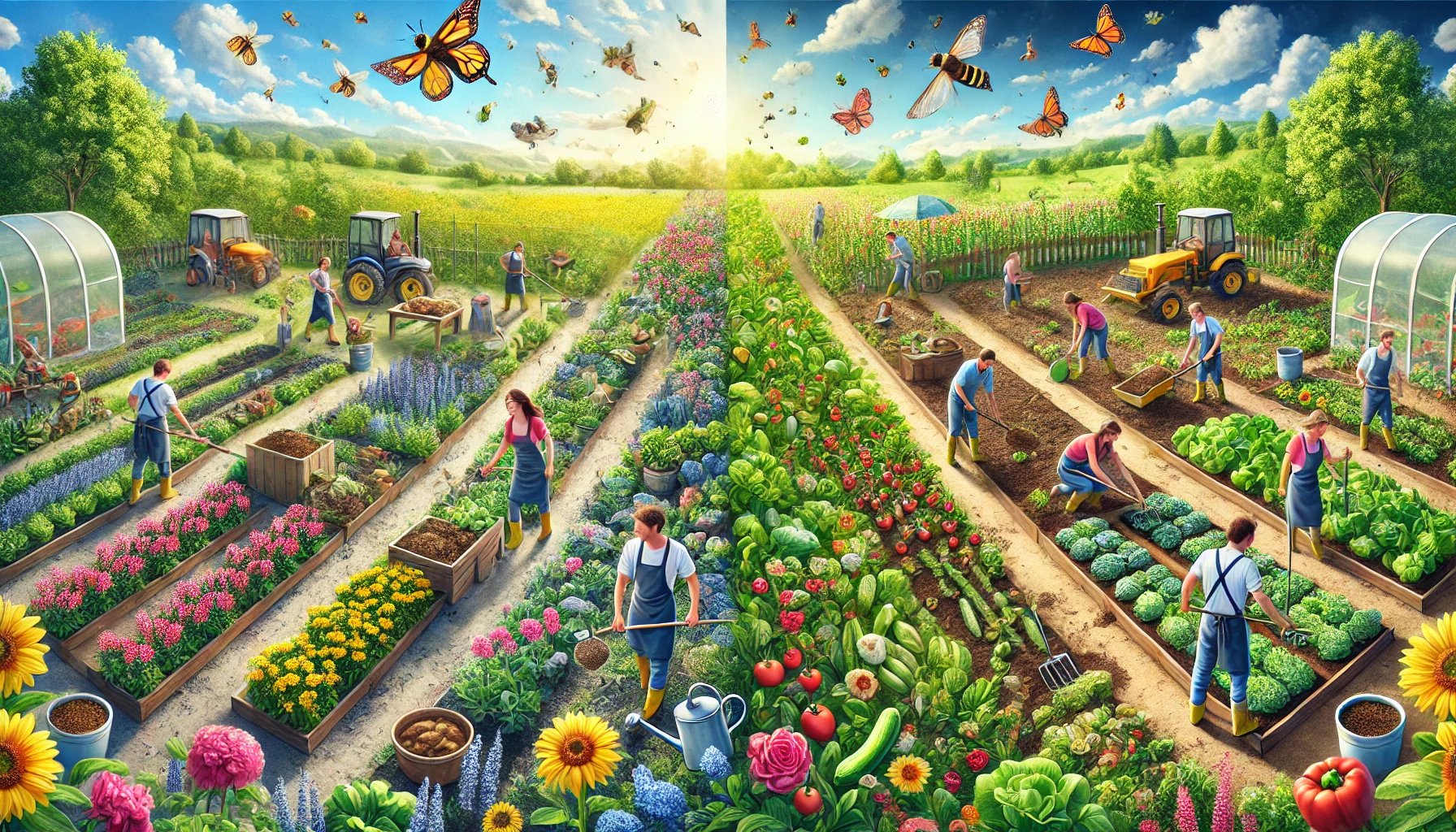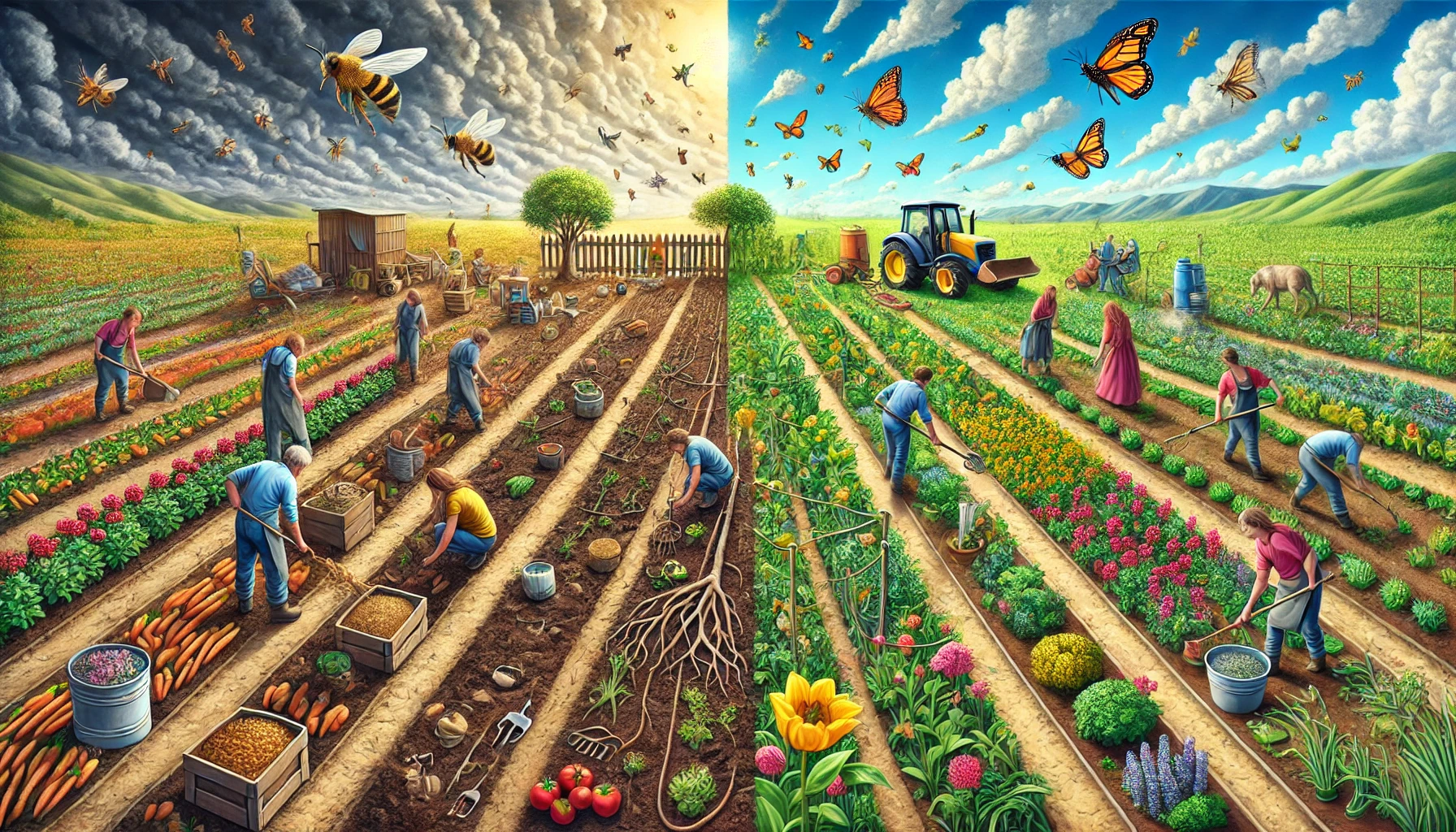In recent years, the debate over Organic Gardening Vs Conventional Gardening has gained significant attention among home gardeners and environmental enthusiasts alike.
As more people strive to make healthier choices for themselves and the planet, understanding the differences between these two gardening methods has become increasingly relevant. But what exactly sets them apart, and which approach offers the most benefits?
In this blog post, we’ll delve into the core differences between organic and conventional gardening, explore the impact of each method, and help you decide which is best suited for your gardening goals.
What is the Difference Between Organic and Conventional Gardening?
At its core, the distinction between organic gardening and conventional gardening lies in their philosophies and practices.
1. Gardening Practices and Philosophies
- Organic Gardening focuses on working with nature rather than against it. It emphasizes the use of natural processes and materials to cultivate plants. This means relying on compost, mulch, crop rotation, and natural pest control methods like companion planting or introducing beneficial insects.
- Conventional Gardening, on the other hand, often prioritizes efficiency and higher yields. It typically involves the use of synthetic fertilizers, chemical pesticides, and herbicides to maximize growth and protect crops from pests and diseases.
2. Chemical Usage
One of the most significant differences between the two gardening styles is chemical usage.
- In conventional gardening, synthetic fertilizers supply plants with essential nutrients quickly, while pesticides and herbicides help control weeds and pests. Although effective, these chemicals can have unintended side effects, such as contaminating soil and water or harming beneficial insects.
- Organic gardening avoids synthetic chemicals entirely. Instead, it focuses on natural fertilizers like compost or aged manure and pest control methods that do not pose a risk to the ecosystem. This absence of synthetic chemicals plays a crucial role in protecting soil health and nearby ecosystems.
3. Environmental Impact
- Conventional gardening practices, especially when chemicals are used extensively, can contribute to soil degradation, water pollution, and a decrease in local biodiversity. Runoff from chemical fertilizers and pesticides can contaminate nearby rivers and lakes, leading to ecological imbalances.
- Organic gardening tends to have a lower environmental footprint. By using natural soil amendments and fostering biodiversity, organic gardens can improve soil structure, promote healthier ecosystems, and reduce pollution.
Is Organic Gardening Better? A Closer Look at Benefits
While conventional gardening offers certain advantages, such as faster plant growth and higher short-term yields, many gardeners are turning to organic methods for their long-term benefits. Let’s take a closer look at why organic gardening might be the better option.
1. Environmental Benefits
One of the strongest arguments in favor of organic gardening is its positive impact on the environment. Organic methods help:
- Reduce chemical pollution: Without synthetic fertilizers and pesticides, there’s less risk of harmful runoff entering waterways.
- Enhance soil health: Organic gardening practices, like composting and crop rotation, naturally enrich the soil, making it more fertile over time.
- Support biodiversity: Organic gardens are often teeming with life—from pollinators like bees and butterflies to beneficial insects that help control pests.
2. Health Benefits
There’s ongoing debate about whether organic produce is significantly more nutritious than conventionally grown food. However, there are undeniable health advantages:
- Reduced pesticide exposure: Organic gardening eliminates the use of harmful pesticides, meaning the fruits and vegetables you grow are free from chemical residues.
- Better for children and pets: Gardens maintained without synthetic chemicals are safer environments for kids and pets to play in.
3. Long-Term Soil Health and Biodiversity
Organic gardening is often seen as a long-term investment in the health of your soil and local ecosystem. By promoting natural processes, organic gardens:
- Increase soil fertility: Over time, organic practices build nutrient-rich soil that can support plant growth season after season.
- Encourage a balanced ecosystem: Healthy soil teeming with microbes and organic matter fosters diverse plant and insect life, creating a self-sustaining environment.
Which Gardening Method is Right for You?
Choosing between organic gardening and conventional gardening often comes down to your personal values and gardening goals. If you prioritize quick yields and don’t mind using chemical inputs, conventional gardening may suit your needs.
However, if you’re focused on sustainability, environmental health, and growing chemical-free produce, organic gardening is the way to go.
While organic gardening may require more time and effort upfront, the long-term rewards—for both you and the environment—are well worth it. Plus, there’s something incredibly satisfying about knowing your garden is thriving naturally, without the aid of synthetic chemicals.
Organic Gardening Vs Conventional Gardening: A Farming Perspective
Gardening has long been a beloved practice for individuals and farmers alike, but when it comes to large-scale farming, the choice between organic and conventional gardening methods has become a significant debate.
Both approaches offer unique advantages and challenges, affecting everything from farm productivity and economic outcomes to societal impacts and sustainability. This article delves into the key differences between organic and conventional gardening from a farming perspective.
Economic and Productivity Differences in Farming Models
When analyzing organic versus conventional farming, one of the most critical considerations is the economic and productivity outcomes associated with each model.
Conventional Farming: Conventional farming is often lauded for its high productivity and cost-efficiency. The use of synthetic fertilizers, pesticides, and genetically modified organisms (GMOs) enables farmers to achieve higher crop yields on larger scales.
This method typically results in lower food prices for consumers and higher profit margins for large-scale producers. However, these benefits often come with hidden costs, including environmental degradation and potential health risks from chemical residues.
Organic Farming: Organic farming focuses on natural processes, using organic fertilizers, crop rotations, and biological pest control. While this method is more environmentally friendly, it often results in lower crop yields compared to conventional farming.
The increased labor and resource intensity can lead to higher production costs, which are frequently passed on to consumers in the form of higher prices.
Despite these economic challenges, the demand for organic products continues to rise, indicating a growing market segment willing to pay a premium for perceived health and environmental benefits.
Societal Impact of Each Model in Local and Global Systems
The societal impacts of organic and conventional gardening extend far beyond the farm, influencing local communities and global food systems.
Conventional Farming: On a global scale, conventional farming has been instrumental in addressing food security by producing large quantities of food efficiently.
However, this efficiency often comes at a cost. The heavy reliance on chemical inputs can lead to soil degradation, water contamination, and loss of biodiversity.
Additionally, large-scale industrial farming practices may contribute to social issues, such as the marginalization of small-scale farmers and ethical concerns surrounding labor practices.
Organic Farming: Organic farming tends to have a more positive impact on local ecosystems and communities. By avoiding synthetic chemicals and focusing on soil health, organic farms often support greater biodiversity and healthier ecosystems.
Locally, organic farming can strengthen community ties through farmers’ markets and community-supported agriculture (CSA) programs.
However, on a global scale, the lower productivity of organic farming raises concerns about its ability to meet the food demands of a growing population.

Evaluating Sustainability Aspects and Future Outlook on Farming Methods
Sustainability is a cornerstone of the organic farming movement, but how do both methods stack up when considering long-term viability?
Conventional Farming: While conventional farming excels in productivity, its sustainability is increasingly questioned. Intensive farming practices can deplete soil health, increase greenhouse gas emissions, and contribute to climate change.
Efforts are being made to improve sustainability within conventional farming through practices like integrated pest management (IPM) and precision agriculture, but significant challenges remain.
Organic Farming: Organic farming is often seen as the more sustainable option due to its focus on soil health, biodiversity, and reduced chemical use. However, its lower yields and higher land use requirements pose sustainability concerns.
Innovations in organic farming, such as agroecology and regenerative agriculture, aim to address these challenges and improve productivity without compromising environmental integrity.
What are the Disadvantages of Organic Farming? The Other Side of the Coin
While organic farming offers numerous benefits, it is not without its challenges and limitations.
Challenges and Limitations Farmers Face with Organic Practices
Organic farming requires more hands-on labor, meticulous planning, and a deep understanding of ecological systems. Farmers must manage pests and diseases without synthetic chemicals, which can be time-consuming and less effective.
Crop rotations and organic fertilizers often require more land and resources, adding to the complexity and cost of organic farming.
Potential Yield Limitations and Economic Implications
One of the most significant disadvantages of organic farming is its potential for lower yields compared to conventional methods. This yield gap can make it difficult for organic farms to achieve the same level of profitability, particularly on a large scale.
Higher production costs are often passed on to consumers, resulting in more expensive organic products. For farmers, this can create economic pressure, especially in markets where consumers are price-sensitive.
Concerns About Regulatory Standards and Market Misconceptions
The organic label is governed by strict regulatory standards, but inconsistencies and loopholes can sometimes undermine consumer trust.
Additionally, there is a common misconception that organic automatically means healthier or more nutritious, which is not always the case. These misconceptions can lead to unrealistic consumer expectations and market distortions.
Conclusion: Finding Your Path in the Gardening World
Both organic and conventional gardening offer unique advantages and challenges, making the choice between them highly personal and context-dependent.
Key Takeaways:
- Conventional farming offers higher productivity and lower costs but often at the expense of environmental and social health.
- Organic farming promotes sustainability and ecological balance but faces challenges related to lower yields and higher costs.
When deciding which path to follow, consider your personal values, local community needs, and the broader global impact of your choices.
Whether you lean towards the efficiency of conventional methods or the sustainability of organic practices, being informed allows you to make choices that align with your goals and values. Ultimately, every gardener has the power to contribute positively to our food systems, one plant at a time.
Final Thoughts
The Organic Gardening Vs Conventional Gardening debate doesn’t have a one-size-fits-all answer. Both methods have their pros and cons, but the growing awareness of environmental issues and health concerns has made organic gardening an increasingly popular choice.
Whether you’re an experienced gardener or just starting, consider the long-term impact of your gardening practices—not only on your plants but also on the world around you.


This article offers a refreshing perspective on gardening that goes far beyond the dirt and plants it invites us to consider how our choices reflect deeper values about sustainability and environmental stewardship. Although I’m not an avid gardener myself, I found the discussion on organic versus conventional methods incredibly thought-provoking. It makes me wonder: How might the simple act of nurturing a garden become a catalyst for broader ecological change? Can embracing organic practices in our backyards set a precedent for a more mindful, sustainable lifestyle? And if every plant we care for contributes to a healthier ecosystem, what other everyday decisions might we reexamine for their long-term impact on our planet? This piece challenges us to think about the far-reaching effects of our actions one garden, one plant at a time.
Thank you for your thoughtful response! It’s amazing how gardening can spark deeper reflections on sustainability and our impact on the planet. I agree—small choices, like embracing organic practices, can truly lead to broader ecological change. It’s inspiring to think how something as simple as tending a garden can encourage a more mindful and sustainable lifestyle!